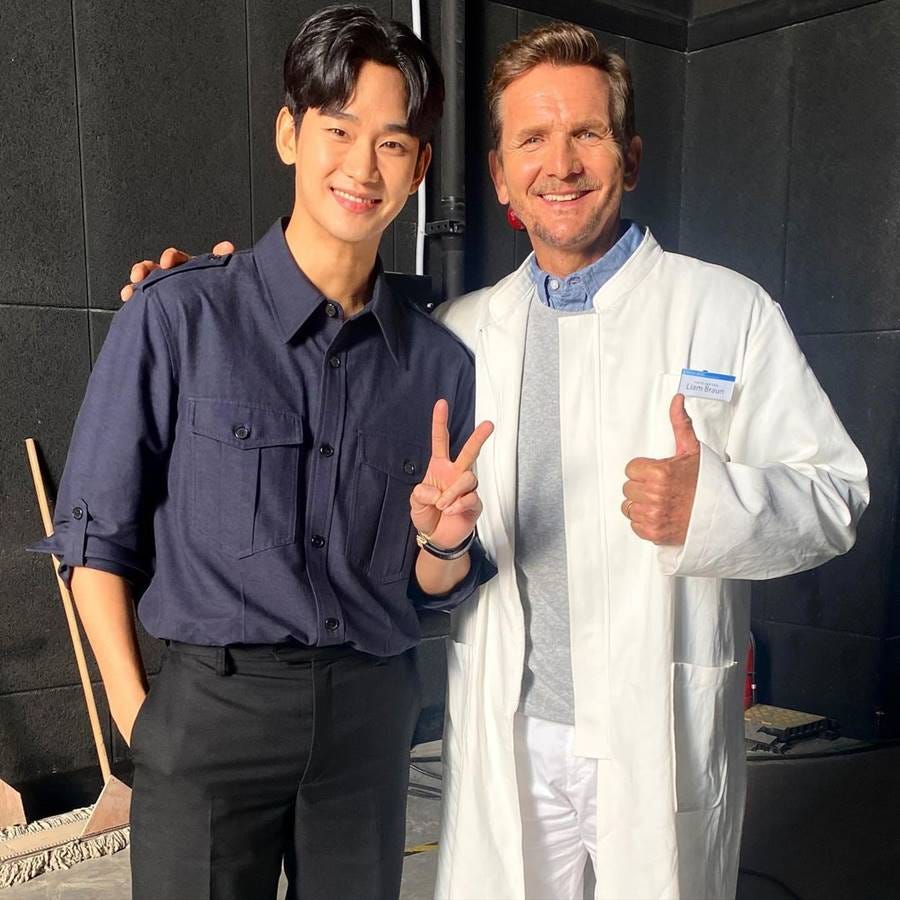
By Jae-Ha Kim
Substack
May 18, 2024
Earlier this year, filmmaker Park Inje — who directed the Disney+ K-drama “Moving” as well as season two of the Netflix hit series “Kingdom” — and I discussed the difficulties of finding good Western actors in South Korea. It can be a challenging process, he said, which is why he changed part of the storyline in the superhero series to accommodate the lack of talented foreign actors in Korea.
[The character of] Frank wasn’t meant to be a Korean adoptee at first. He was meant to be a white character from the U.S. But that turned out to be a little difficult to cast. We decided to take a little bit of creative liberty.
But with “Queen of Tears” — the best K-drama of 2024 to date — viewers are treated to the work of Sebastian Roché, who filmed three episodes. The critically-acclaimed actor is a familiar face in films (The Last of the Mohicans, We Love You Sally Carmichael!), theater (“Titus Andronicus,” “Macbeth,” “Trainspotting”) and television (“1923,” “Supernatural,” “Law & Order,” “Sex and the City,” “The Vampire Diaries,” “Scandal”). Here, he portrays a world-renowned German doctor who can potentially save the life of the female lead (portrayed by Kim Ji-won).
To be honest, I initially feared that Roché might not fare well in his K-drama debut. After all, when other white actors were criticized for their poor, stilted acting, they said it was because they were told to talk slower. Or they were directed that way. Or … the dog ate their homework. (Okay, I made that last one up.) And I’m not saying any of that isn’t true. Maybe there is some validity to their explanations.
But that said, I’ve also heard enough anecdotes about people who were cast simply because they looked the part (i.e. white), rather than for having any acting experience at all. And, yes, I am aware that the U.S. entertainment industry isn’t exactly innocent in this matter either. How many horrible “actors” have we seen cast in projects because they were genetically blessed with good looks?
But Roché’s appearance proved that taking the time to cast skilled actors of any nationality truly can benefit the show. Their acting doesn’t take viewers out of the moment. (In the case of “Squid Game,” I literally was angry at the Snidely Whiplash-sounding actors who were cast presumably because they were white.)
For Roché, his love for K-dramas flourished during the pandemic lockdown, when he and his wife — the actress Alicia Hannah-Kim (“Cobra Kai”) — found comfort in watching Korean shows together. At that time, neither expected that just a few years later, they would be in Korea for his work.
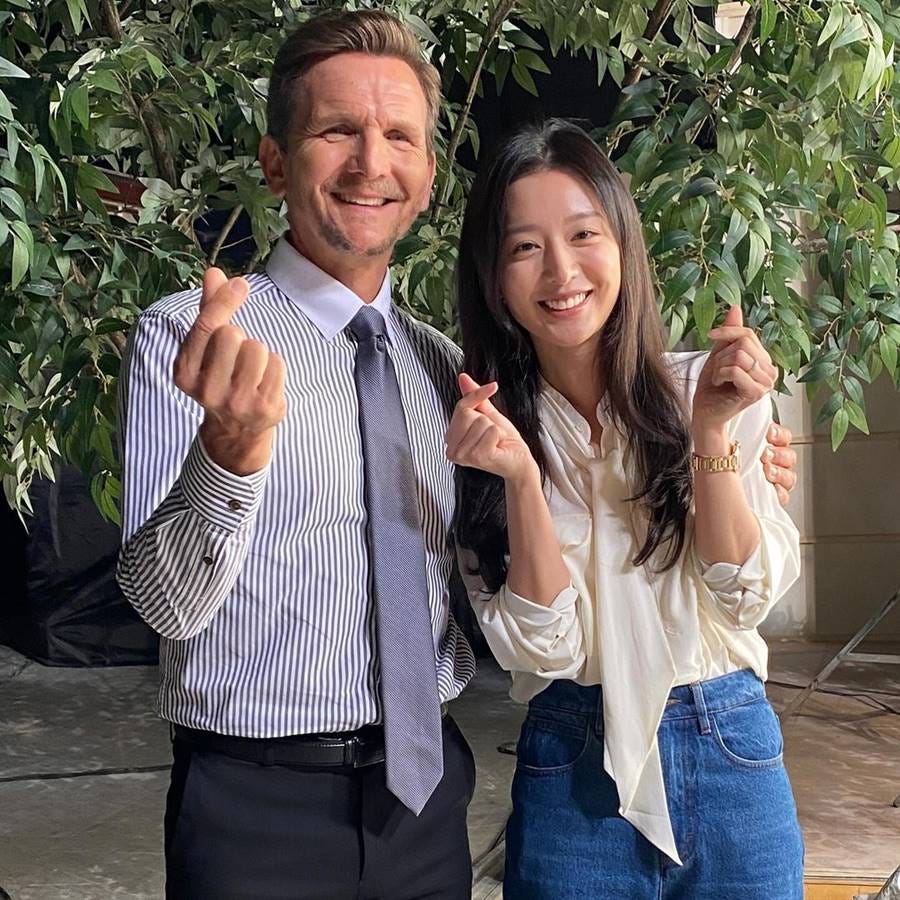
I have been pretty vocal about the poor quality of Western actors appearing in K-dramas. It seems like they just generally cast people who looked the part, but aren’t necessarily actors. As an actor, what are your feelings about the quality of non-Korean actors in Korean shows?
Sebastian: I think that the problem that happens with certain shows is the lack of a bigger acting pool in terms of Western actors. Depending on the budget, I think that certain productions will have difficulty in hiring well known actors for these parts, so they have to go with the next best thing, which is a much smaller swath of actors in Korea itself. I don’t want to judge, but you do get a better end result if you cast the roles according to the quality of the performances given in the audition process or from proven successful actors. I would encourage productions to use experienced and well known foreign actors for Western roles. It can only make their brilliant shows even better.
When we did our interview last year, you were promoting your series “1923.” But I could tell that you wanted to tell me something that was a secret. You looked over to Alicia and said you couldn’t discuss it yet. I felt like it must have had to do with a Korean drama, but wasn’t sure. Can you share a little bit about the process? Did you have to audition? Did they reach out to you?
Sebastian: We have dear friends at [the production companies] Studio Dragon and Showrunners. It was very serendipitous. We were on our way to Korea for a vacation and they kindly asked me if I would be interested in doing a cameo on “Queen of Tears.” I jumped at the chance, of course, being a huge K-drama fan. My wife jumped into combat mode and organized the whole thing within a matter of two days and the rest is history. Thank you Alicia, I love you.
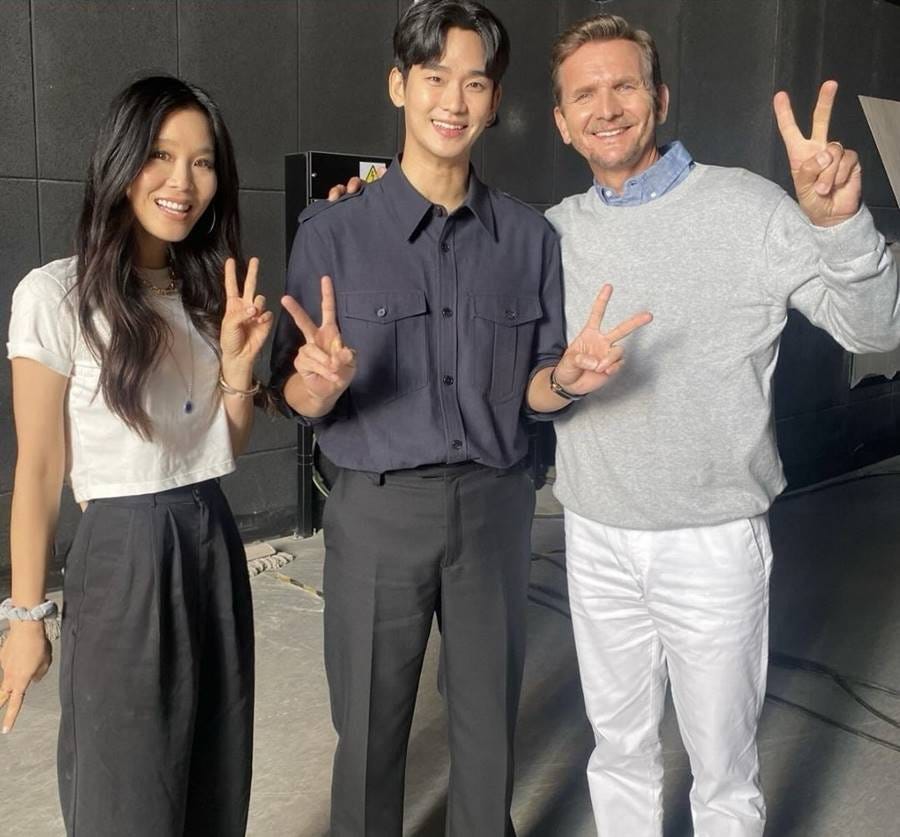
Kim Soo-hyun is one of the most famous actors in Korea. You’ve worked with so many well known and critically acclaimed actors in your career. Did it hit differently working with Soo-hyun, beyond the obvious language barrier?
Sebastian: It was wonderful because I had been a big fan of his after “It’s Okay To Not Be Okay.” It does hit you differently, but being on a set always feels familiar whatever country you’re in, so your actor’s instinct and professionalism take over and you see a scene partner — even a star — as your equal. And Kim Soo-hyun and Kim Ji-won couldn’t have been nicer and down to earth, as were all the wonderful crew and the two wonderful directors Jang Yong-woo, who directed me, and Kim Hee-won. The [CJ ENM] studios we shot in were the most beautifully immaculate I’d ever seen. I felt very comfortable and completely supported. It was so much fun to share those scenes with these two brilliant actors. It was also surreal after having been introduced to K-dramas with “Crash Landing On You” [known to K-drama fans as simply CLOY] and here I am four years later doing a huge drama written by [CLOY’s] Park Ji-eun!
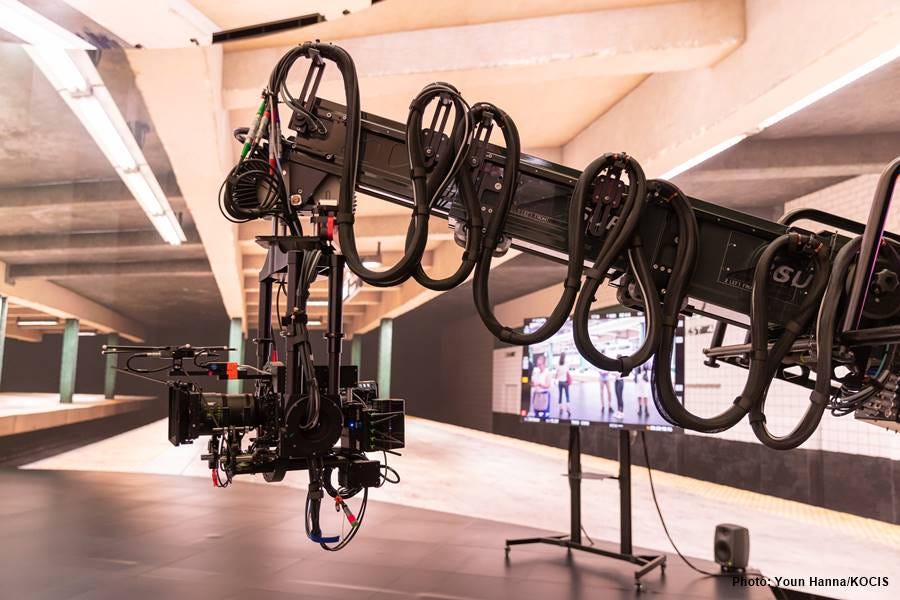
I know that you are studying Korean. How much Korean did you understand on set? And do you think you would like to tackle a K-drama with your dialogue in Korean next time?
Sebastian: I am studying Korean, but not fluent yet at all, although I can understand quite a bit depending on the speed of the dialogue. I would love to sink my teeth into a character that speaks both. I don’t think that I have the proficiency yet to play a character that speaks full Korean.
How did you initially get interested in watching K-dramas?
Sebastian: My wife being Korean was the main catalyst, but it was actually the father of one of our friends — the actor Tom Lenk — who told him that CLOY was the series to watch on Netflix. So Tom’s dad started it all. Thanks, Tom’s dad! And thanks Tom for telling us.
CLOY was your gateway K-drama. What are some of your other favorite Korean shows?
Sebastian: I was hooked after CLOY. At the top of the list is “My Mister” — probably one of the best TV series I’ve ever seen. Hard to watch now with the tragic passing of the extraordinary Lee Sun-kyun. “Goblin,” “Itaewon Class,” “When the Camelia Blooms,” “It’s Okay To Not Be Okay.” And, of course, now “Queen of Tears,” which I absolutely loved — and many more are on the list. There are so many we’ve seen and adored.
What has the response been from your fans who have previously watched you only in Western productions?
Sebastian: The response was overwhelming. People seemed to be truly pleased that I appeared on such a great show. And I want to thank the fans for all your kind words. I really encourage my peers to go work in Korea. I’ve always been so impressed with the quality of the film and TV industry in Korea and it did not disappoint. They have state-of-the-art facilities and top notch directors, writers, actors, and producers. I was incredibly impressed by the studios. I shot at the CJ ENM Studio Center in Paju. [They have] incredible facilities and professionalism on the part of everyone involved.
[Editor’s note: RM of BTS also filmed his music video for “Come Back to Me” in Paju, though not at this same studio.]
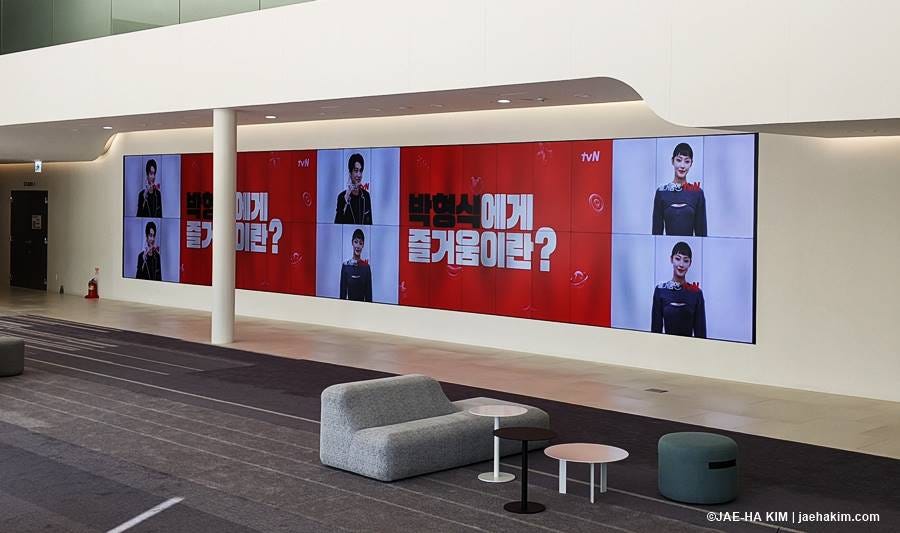
Was it difficult keeping your casting a secret for so long?
Sebastian: Oh yes! We told very few people and swore them to secrecy. It was such a relief to tell the world. Some of our friends couldn’t believe it. I couldn’t believe it. I fell in love with K-dramas during the pandemic and three years later I am in one of the biggest dramas of all time! It’s surreal.
Finally, what would you like to tell someone who has never watched a K-drama but is wondering what is so special about them?
Sebastian: There so much that is so special about Korean dramas. I truly appreciate the incredibly imaginative storytelling in those series. And there are so many genres. They can really tell a truly beautiful and romantic love story. They are not afraid to put as much emotion and imagination in the story as possible. And I do love the 16 episode format. You can see how delicately the story has been worked on. You accompany that with some of the best acting I have seen on screen. And incredible production values, high level directing, writing, and producing. The multiplicity of genres is incredible as well, whether it be a romantic, historical, crime, family, tragedy, comedy, science fiction drama — they have it all. But for me, it is all about the storytelling and the emotional content. They are unafraid to show true, raw emotions. Korean film and TV creative talents are masters at it.
Besides being a regular on the upcoming bilingual crime series “The Gringo Hunters” — which is helmed by Imagine Entertainment’s Ron Howard and Brian Grazer — Sebastian Roché also is reprising his role as Father Renaud in Taylor Sheridan’s prestige series “1923” for Paramount+. (The new season will premiere in the second half of 2024.)
© 2024 JAE-HA KIM | All Rights Reserved
2 thoughts on “Hallelujah! A K-drama finally got it right by casting a non-Korean actor who can act!”